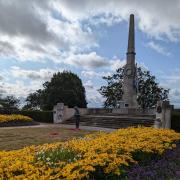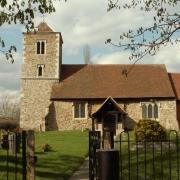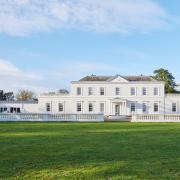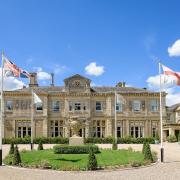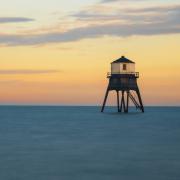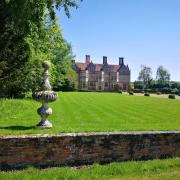ith Remembrance weekend approaching, it’s appropriate we look at a military figure this month, someone who served in both world wars. A British field-marshal, soldier and administrator whose military service extended over more than four decades (1901-43). Archibald Wavell was known as ‘Archie’ but also ‘The Chief’ which indicates how he was admired, although another moniker he attracted was the less flattering ‘Podgy’. Yet Wavell was not a natural soldier, a role he’d been pushed into by a Major-General father; he openly admitted he was happier with literature, poetry and the classics.
Being born in Colchester (some sources erroneously say Winchester) was apt for Archibald Percival Wavell, a man destined for the Army, as it’s been a significant military base since Roman times, becoming an important garrison town during the Napoleonic era. Wavell was the son of another Archibald Wavell, an Army major-general who was keen his son should follow suit, and Lillee, née Percival. Wavell was actually educated at Winchester, hence the confusion on his birthplace, and then at Sandhurst, before being commissioned into the famed Black Watch in 1901. His headmaster remarked that a military career wasn’t his only hope as he had: ‘sufficient ability to make his way in other walks of life’; true enough.

Wavell served in South Africa (2nd Boer War) and India before seeing action in WW1 when he was wounded at 2nd Ypres, losing the sight of his left eye on 16th June 1915 due to a shell splinter. Wavell was often in the trenches, not the château general a la ‘General Melchett’ (‘Blackadder Goes Forth’). Not all Wavell’s injuries were so heroic, an earlier one permanently impaired one arm due to a mishap playing battalion footie. His WW2 command also saw him involved in a number of aerial mishaps, from crashes to forced landings, whilst a slip from a seawall in Singapore saw him crash heavily on to rocks; perhaps a tad accident prone. An eventful WW1 had also seen Wavell married in 1915 to Eugenie Marie Quirk, a marriage bestowing four children including another Archibald Wavell (1916-53), the 2nd Earl, who followed his father as an Army officer and peer but was sadly killed during the Kenya Emergency in 1953 aged just 37.
Posted to the General Staff, Wavell’s admiration for the style of command exercised by British general Edmund Allenby (1861-1936) inspired him to write two pithy books still regarded as exemplars of their type; succinctly prose-worthy. Allenby had also served in South Africa and during WW1 when his Palestine campaign had been a model of preparation and drive. Between the wars Wavell was given command and staff appointments which steadily became more important. He also contributed articles to the Encyclopaedia Britannica. His troop training was original, exercise names oft-borrowed from his love of lit and classics, e.g. one named ‘Golden Fleece’ (look up Jason and the Argonauts if you’re unsure). Wavell was regarded as an excellent trainer of front-line soldiers, his emphasis on flexibility and mobility extending to being the first to conduct a long tactical advance of troops utilising road transport, in this case a fleet of buses. He had a liking for the unorthodox and the use of deception but also a trenchant belief that an officer should never think a cause or battle lost.

Lees Knowles Lecturer at Cambridge University in 1939, Wavell was then given the Middle East Command (1939-41) but WW2 saw him under pressure, facing eight separate campaigns, five simultaneous, with ominously meagre resources. It was a situation demanding much of a character normally regarded as ‘robust’. He responded by skilfully defeating a numerically superior Italian army, capturing 130,000 prisoners, 400 tanks and 1,200 guns, and deftly capturing Abyssinia (1941). Having to relinquish 60,000 troops to try and prevent the Germans taking Greece and Crete was probably a fatal blow, those depleted resources coming back to bite him, leading ultimately to a reversal in fortunes as Erwin Rommell advanced in North Africa (1941). He then served as Commander-in-Chief, India (1941), Supreme Commander Southeast Asia (1942), and Commander in India and Burma (also 1942), suffering a second setback as he failed to hold back the Japanese in the then Malaya and Burma (1942) as well as Singapore, his cause seemingly hindered by underestimating his latest opponent. Wavell’s reputation suffered from these defeats but it’s hard to see what more he could have done with what he had, particularly in North Africa where he was tasked with fighting a ‘poor man’s war’.


Between 1943-47 Wavell was Viceroy of India during a difficult time preceding the transfer of power from Britain when he favoured an early dart for independence. He also became a field-marshal and viscount in 1943, an earl in 1947, Constable of the Tower of London (1948-50) and Lord-Lieutenant of London (1949-50). Wavell wasn’t just a soldier. He loved reading and poetry, the latter reflected in his anthology ‘Other Men’s Flowers’ (1944), whilst his military textbook ‘Generals and Generalship’ (1941) was ironically essential reading for his greatest adversary, Rommel. I guess there’s no greater compliment than inspiring your enemy. Wavell preferred a copy of Mallory in his pack; perhaps Arthurian stories inspired his own chivalry.
Elevated to the peerage as 1st Earl Wavell in 1943, he served in the House of Lords until his death around seven years later. His memorial in Winchester Cathedral proclaims: ‘And glory is the least of things that follow this man home. For all that loveliness, that warmth, that light, blessed Madonna, I go back to fight’. It is the hymn of the soldier. And what kind of person was he? With those he knew he could be witty and light-hearted but with others he was often introspective, a man of few words, which tended to create an atmosphere of mutual suspicion. That fug of distrust even affected his wartime relationship with Churchill; it was no wonder someone said of Wavell that: ‘He is no politician’. No, but he was a soldier and a fine one at that.

CHRONOLOGY
1883 – Archibald Percival Wavell born in Colchester (5th May).
1901 – Wavell is commissioned into the famous ‘Black Watch’.
1915 – Wounded at 2nd Ypres and marries Eugenie Marie Quirk.
1939 – Wavell given the Middle East Command at the start of WW2.
1941 – Possibly Wavell’s finest hour as he takes Abyssinia off the Italians.
1942 – Experiences failure against the Japanese as Singapore falls.
1943 – As Viceroy of India (until 1947) favours an early move to independence.
1944 – Publication of Wavell’s poetry anthology, ‘Other Men’s Flowers’.
1950 – Death of Field Marshal Wavell in London (24th May), aged 67.






